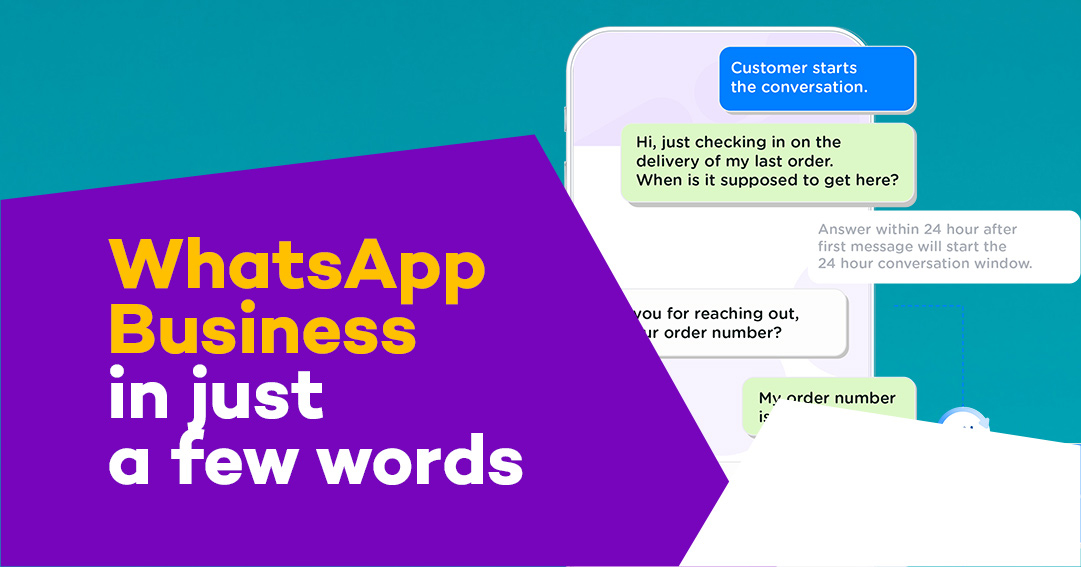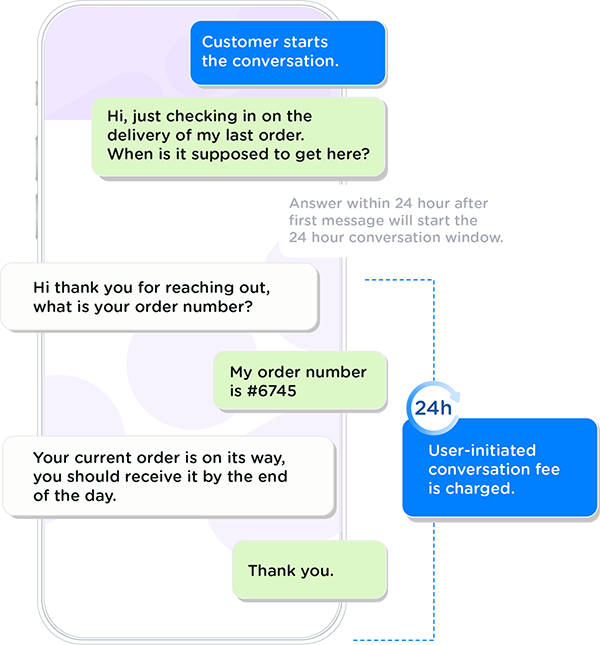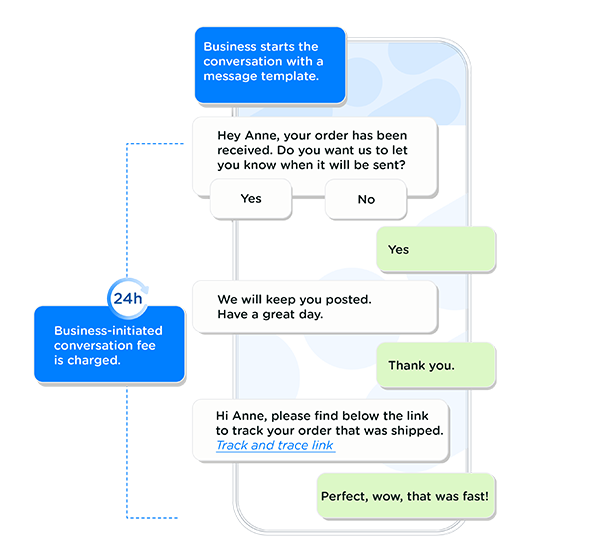
WhatsApp Business API’s New Fees
As of February 1, 2022, WhatsApp will change its pricing model. The new rates will be based on conversations. Let's see what that means!
WhatsApp is one of the most popular global messaging channels. It has 2 billion active users monthly, who send a total of 100 million messages a day. And thousands of companies are among these users using WhatsApp Business in their business-to-customer (B2C) communications.
WhatsApp Business allows companies to create meaningful one-on-one conversations. And, recently, the application has announced that it will make changes to the pricing model from the beginnings of February 2022.
First of all, we would like to clarify that this article talks about the changes in WhatsApp Business API rates, which is the payment service that can be integrated into any platform and massively pick up calls, conversations, install a chatbot, etc.
The WhatsApp channel continues to have a free mobile app version for everyone and also a mobile app for small businesses that want to maintain basic and manual communication with their customers and contacts. These two types of communication have not changed and therefore we will focus on the new pricing model of the WhatsApp Business API.
Regístrate y prueba enviar SMS con LabsMobile
¡Empieza aquí y ahora!Index
WhatsApp Business in just a few words
Before plunging into the pricing change, it’s important to know how WhatsApp Business works.
There are two types of messages allowed in WhatsApp Business:
- Messages sent by clients
- Template messages sent by companies
Session messages initiated by clients in WhatsApp Business
A customer-initiated session begins when a user sends a message to your business in the WhatsApp inbox or channel, allowing them to respond to messages within a 24-hour customer service window.
Until now this conversation window extends when customers continue to interact. Within the session, it is possible to personalize and/or automate your customer service (with type responses, option menus, or chatbots).
Template messages initiated by a company in WhatsApp Business
Once the session message window is closed (or at the will of the company), it is possible to send message templates (pre-approved by WhatsApp) as notifications or reminders to communicate with customers who have an active subscription to WhatsApp.
This also means that a conversation can be started with those message templates by the company and a window of 24 hours opens in which a conversation can take place.
Pricing model as of February 1st 2022
Until February 1, the WhatsApp Business pricing model was based on the number of message templates sent outside of the 24-hour customer support period mentioned above. Therefore, every time a templated message (to start a conversation) was sent, WhatsApp charged a flat rate.
This means that if a customer sent a message to you, WhatsApp wouldn’t charge for these messages (including templated messages) until 24 hours after the last message that the customer sent. Any additional message to be sent to that customer beyond the customer support window had to be a templated message.
Changes in Whatsapp Business’ fee model
New pricing model:
From February 1, WhatsApp is introducing a new pricing model based on conversations. This means that a rate will be charged per conversation, rather than per message (template) sent.
The new fees will depend on who initiates the conversation: the business or the client. But what is a conversation exactly in this new pricing model? And how does it work?
Conversation fee of free 24 hours in WhatsApp Business
WhatsApp defines a conversation as a fixed 24-hour session that includes all the messages delivered to this particular client. You will be charged once for each 24-hour conversation, with no additional charges for any additional messages sent by you or your customer.
The 24-hour chat window starts when:
- You send a message (from a template) and the message is delivered to your customer, regardless of whether your customer replies or not. This is a "business-initiated" conversation. This is a conversation started by WhatsApp Business.
- Or when the customer sends a message that is delivered to you and you reply with a message that is also delivered to your customer. This is a "user-initiated" conversation. This is a conversation initiated by the WhatsApp user.


WhatsApp Business API’s New Fees
If the conversation continues after this 24-hour window session, a new 24-hour conversation window will be counted and charged.
Consecutive conversations will be charged as user-initiated (as long as the customer was the first to engage outside of the previous window) and the business continues to send messages within the new 24-hour customer service window.
Once the customer service window closes, the business will need to use a template message to continue conversations with the customer and will be charged for a business-initiated conversation.
You should note that the 24-hour chat session only starts when a message is delivered. Undelivered messages will not count as starting a conversation and you will not be charged for them.
The cost of the 24-hour conversation varies by country/region and by the type of conversation (business or user initiated). You can check the WhatsApp pricing overview to see what type of rates will apply for your business.
What are the extra benefits of Whatsapp’s Business New Pricing model?
¡El nuevo modelo de precios basado en conversaciones incluso viene con algunos beneficios agradables!
1 The main benefit is the free conversations as point of entry feature. This means that, with this new pricing model, WhatsApp will also focus on expanding the use cases of its other Meta products, like Facebook and Instagram.
If one of your clients starts a conversation on WhatsApp from a Facebook or Instagram ad or clicks on a call to action button on a Facebook page that leads them to WhatsApp, the platform won’t charge for that conversation.
2 Another perk is that the first 1000 conversations of each month are free. Yes, you read that right! WhatsApp will give you 1000 free conversations each month! This will give your business the opportunity to experience this messaging platform before you have to pay.
What Problems Can Stem From This New Payment Method?
No Cost Limits
There is no cost limit from the company. This is to say that any conversation started by a client now generates a window and an unbounded cost. So, it makes sense that, for example, a company with many logistic or service issues may incur an exponential cost in its WhatsApp Business bills.
Integrator Cost
The WhatsApp Business API must be paired with an integrator or a Facebook-connected platform. This platform or system will charge a fee to use its services or for the communication that will need to be added to the cost of these new WhatsApp fees. For example, if you need a platform with a customized chatbot and agents that reply your messages, it will surely be necessary to cost the development and maintenance of the chatbot and the customer support platform for manual conversations.
SMS-dependent costs
As can be seen in the list of new prices by country, the cost in each territory is similar to that of an SMS message. That hints at the rivalry of these two channels and that Facebook will change prices based on the price of the SMS.
For example, in recent months, there has been a strong increase in the price of SMS in Peru imposed by telephone operators. And this increase is also reflected in the new WhatsApp Business rates.
Something similar happens in Colombia, where the unit price of each SMS message is much lower and Facebook adjusts the price to adapt it to this market.
Therefore, Facebook will surely change the price of these conversations without prior notice and completely unilaterally, increasing the cost for those companies that have made an investment and have a functioning WhatsApp Business system.
Cost for any interaction
Until recently, many companies and brands devised their processes (support, marketing, etc.) so that the user would go to the company's WhatsApp profile and start a conversation at no cost. With the change to costs per conversation, any interaction (regardless of who initiates it) has an associated cost.
This will surely make many companies rethink their communications and processes since the cost of this service could increase a lot, especially if users are now accustomed to communicating via WhatsApp or the company's activity requires communicating with a large number of customers.
All in all, we see how the new WhatsApp Business rates are aimed at facilitating certain services, such as user support and customer service for large corporations and brands. For sure, efficient and semi-automatic integration of this channel can greatly reduce the costs of a big company that previously needed a large call center or customer service team.
However, the changes in pricing are not currently intended for a few one-way communications or for small or medium-sized businesses that cannot afford the cost, integration, or complexity of this channel.
What impact will these changes have on companies?
So, what impact will the new pricing model have on your business beyond the benefits mentioned above?
1 Customer service or support
Is your customer service set up to respond to incoming messages from your customers? Now, you will be charged for each customer-initiated conversation.
2 Multiple company-initiated messages in a single dialog
Are you sending multiple messages or notifications (using a template) within the 24-hour conversation window? If so, we have good news for you. You will only be charged once for starting the conversation, with no additional costs for (extra) message templates.
3 Sporadic messages initiated by the company
Are you sending messages or notifications (using a template) over multiple 24-hour periods? You will be charged for each message, as WhatsApp will identify those 24-hour sessions as new conversations. In the event that they are unidirectional communications, other communication channels should also be considered for sure.
4 Campaigns or marketing messages through other channels
Do you use emails, SMS, or other channels to take your customers to your WhatsApp profile and finalize the conversation? In this case, from February on, each conversation will also have a fee if the client initiates it, although these types of conversations have a lower cost.
5 Multiple chat windows
Do you frequently create conversations of more than 24 hours? Our first tip for you is to try to reduce the period of the conversation to less than 24 hours. If this is not possible, we recommended that you send a message just before the end of the 24-hour window so that the next message is initiated by the client and thus, you pay the lower price corresponding to a conversation initiated by the client.

Our team advises you
Interested in our services?
Our managers and technical team are always available to answer all your questions about our SMS solutions and to advise you on the implementation of any action or campaign.
Contact us

